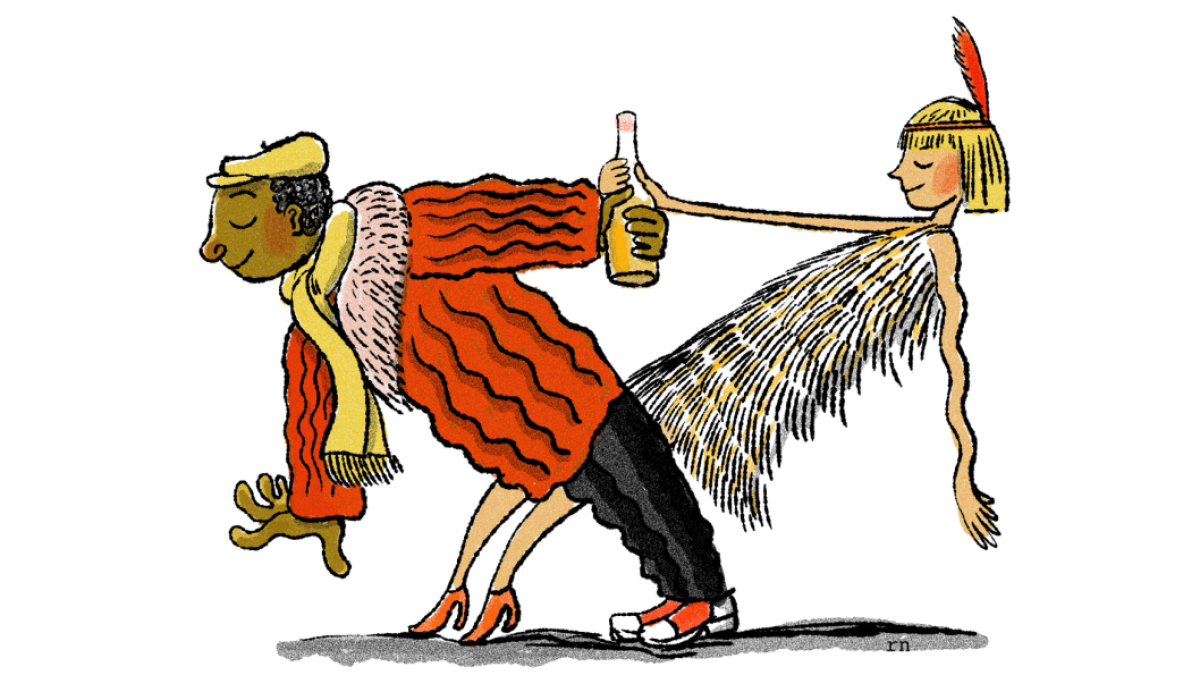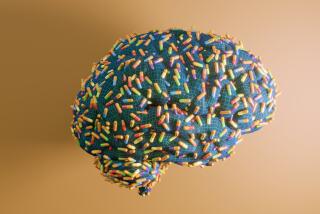Op-Ed: English language is loaded (or fou, or blotto) with ways to say ‘drunk’

Way back when English was Old English, between AD 600 and 1100, you were either “drunken” or “fordrunken” (very drunk) after a night of carousing. Even today, “drunken” will do for describing how you may be spending New Year’s Eve. But you might also be “blinkered,” “oiled” or “lit.”
“Nothing in Old English vocabulary,” writes David Crystal, in his new book, “Words in Time and Place,” “anticipates the extraordinary growth of the alcoholic lexicon.”
Crystal, with reference to the Oxford English Dictionary, charts that growth, documenting when and how 150 terms for too much of a good thing entered the language. In time for your New Year’s revelry, here are a few of them:
drunk, c. 1340. The default term, a development of “drunken” and still the commonest usage.
inebriate, 1497 (obsolete). The first of the scholarly expressions, from Latin “inebriatus” (intoxicated), and used literally and figuratively. The earliest OED citation is in fact about someone “inebriate in the love of God.” The first recorded use of “inebriated” is much later (1615). In an 1839 essay by Henry Rogers, we see a summary of the way a semantic distinction would later evolve: “To be drunk is vulgar; but if a man be simply ‘intoxicated’ or ‘inebriated,’ it is comparatively venial.”
bousy, 1529. The first instance of “boozy.” An early use of a verb “bouse” is recorded c.1300, from Dutch (where it was originally the name of a drinking vessel), but it doesn’t become common until the 16th century, along with the adjective, at first chiefly among thieves and beggars. Alexander Pope (“Up rose the bowsy Sire,” “The New Dunciad,” 1742) is one of a long line of poets to be attracted to the word.
fou, 1535. A Scots word, derived from “full.” Robert Burns uses it in his poem “Death and Dr. Hornbook” (1786): The poet meets Death on the road and reflects on how much he’d had to drink: “I was na [not] fou, but just had plenty.” It is still used in parts of Scotland, especially in such phrases as “blin fou” (blind drunk) and “fou as a puggie” (drunk as a monkey).
tippled, 1564. A “tippler” was a retailer of ale — a tavern keeper. (The word may be related to “tap.”) It is first recorded in 1396, curiously, long before the associated verb (to “tipple” — to sell liquor), which is known only from the early 16th century. Around that time, a habitual drinker also came to be called a “tippler.”
whip-cat, 1582 (obsolete). “Whip the cat” has long been used as an idiom with a wide range of meanings, such as to shirk work or play a practical joke, and to get drunk was one of the earliest. Presumably the drunkard comes home in a bad mood and takes it out on the cat. “Jerk,” “shoot” or “whip the cat” also meant “vomit,” especially from too much drink — a usage recorded by the OED under “cat.”
pottical, 1586 (obsolete). This is an adaptation of “pot” (as in modern “pint pot”), to refer to a poet who has been “inspired by alcohol.” It is a pun on “poetical.”
fox-drunk, 1592 (obsolete). This is the last in a sequence by Thomas Nashe in his pamphlet “Pierce Pennilesse: His Supplication to the Devil” (1592). There are eight kinds of drunkenness, including “ape-drunk” (leaping about), “lion-drunk” (quarrelsome), “sheep-drunk” (incoherent), “goat-drunk” (becoming lecherous) and “fox-drunk” (becoming crafty). Some of the allusions date from medieval times.
in drink, 1598. It is Shakespeare’s Falstaff who has the first recorded use of this phrase. In “Henry IV Part I” (c. 1597), while play-acting the role of Henry IV, he tells Prince Hal: “I do not speak to thee in drink, but in tears.”
tap-shackled, 1604 (obsolete). As in “fettered to the tap of the beer barrel.” In his translation of Bishop Hall’s “The Discovery of a New World” (c.1609), John Healey tells of a man who, “being truly tap-shackled, mistook the window for the door.”
in one’s cups, 1611. The King James Bible gave this expression a popular boost, which has lasted to the present day. In the first book of Esdras (3:22), a young man writes about what wine does to people: “And when they are in their cups, they forget their love both to friends and brethren, and a little after draw out swords.”
stewed, 1737. This is the first of the cooking-related slang substitutes for “drunk,” where the notion of food being slowly and thoroughly boiled in a closed vessel is seen as analogous to the way drinking can steadily reduce someone to a state of total inebriation. (Later terms include “corned,” “ salted” and “pickled.”)
pissed, 1812. The word is chiefly British, along with “pissed up,” “get pissed” and various intensified expressions. The most common simile is “pissed as a newt,” but it’s by no means the only one. In Australia one can be “pissed as a parrot.”
three sheets in (or to) the wind, 1821. Nautical slang, which became one of the most widespread euphemisms for drunkenness. The “sheets” are ropes attached to the lower corners of a sail, to keep it steady, so if three of them come loose, the flapping sails will cause the ship to move erratically.
tight, 1830. It is first recorded as “tightish” — “somewhat drunk,” and seems to have taken a while to settle down as a recognized usage, for OED citations even into the 1880s were still in quotation marks.
swizzle, 1843. In the 18th and early 19th centuries, “switcher” and “sizzle” were slang for drinks made of various mixes, such as molasses and water. A “green swizzle” was popular in the West Indies, acknowledged by P.G. Wodehouse in “The Rummy Affair of Old Biffy” (1924): Bertie Wooster observes, “If ever I marry and have a son, Green Swizzle Wooster is the name that will go down in the register.”
pixilated, 1848. A combination of “pixie” and the “-ated” suffix, with an I added for easy pronunciation. There may also be an echo of earlier “pixie-led” (lost, bewildered) and “elated.”
shickery, 1859. An early instance of a group of colloquial words, all deriving from the Yiddish “shiker” (drunk), later found as “shicker “(1892) and “shickered” (1911). The words came to be used chiefly in Australia and New Zealand. The first tram, bus or train running after the pubs closed was called “the shicker express. “
loaded, 1890. One of the basic meanings of the verb “load” is to supply in excess or abundance, so its application to drink was predictable. It became popular in the U.S., especially among the Beat Generation in the 1950s, along with its application to drugs.
polluted, 1900. An adaptation of the technical sense of “polluted” (“contaminated with poisonous substances”), originally U.S. slang. As with “gassed” and “toxic,” it illustrates the way “dark” sources prove especially attractive to drinkers, the exaggeration implicit in the semantic contrast effectively playing down the seriousness of a drunken condition.
blotto, 1917. The analogy is probably with blotting paper, which soaks up ink as a person soaks up drink. It was a favorite piece of upper-class slang in the first half of the 20th century. Here is Freddie, hung over, in the opening chapter of Wodehouse’s “Jill the Reckless” (1920): “I was possibly a little blotto. Not whiffled, perhaps, but indisputably blotto.”
cock-eyed, 1926. The way drunkenness affects the eyes is a familiar source of new adjectives (as with “owl-eyed” and “pie-eyed”). Since the early 19th century “cock-eyed” has been a way of describing someone who has a squint, so there was an obvious parallel with the way drink can make one’s eyes turn toward each other as they lose focus. The usage began in the U.S., with Ernest Hemingway the first OED citation in “The Sun Also Rises”: “‘You’re cockeyed,’ I said. ‘On wine?’ ‘Why not?’”
liquefied, 1929. The basic meaning is “transformed into a liquid state.” No more to say, really.
juiced, 1946. A slang usage which, judging by the OED citations, seems to have been especially popular among African Americans, often with a reinforcing “up.” We see it in the earliest citation, from Chester Himes’ “Negro Story” (1945): “She was an old wino used to come there every night and get juiced up.” The history of the usage is much older. Benjamin Franklin includes “juicy” as a word for “drunk” in his “Drinker’s Dictionary” (1737).
zonked, 1959. “Zonk” arrives in the 1940s as an onomatopoeic word representing the sound of a heavy blow. The implication was always one of finality: a door would close (“zonk!”) or somebody would be knocked down (“zonk!”). So, when it began to be used adjectivally in the context of “drunk” (at first in North America), the implication was always one of being seriously incapable. Later uses of the adjective, both in relation to drugs and as a slang term for “exhausted,” have made it ambiguous. We need to know the context before we can interpret someone who says, “I’m zonked.”
over the limit, 1966. The phrase arrived when laws were introduced limiting the amount of alcohol that could be taken before driving. Because people can be “over the limit” without necessarily feeling very drunk, the term sits uneasily in this listing, being more legalistic than descriptive.
tired and emotional, 1981. One of the most jocular euphemisms for “drunk,” with early citations showing its use in satirical and comedy settings. The first OED citation is from the British TV series “Yes Minister”: “Hacker tired and emotional after embassy reception.”
David Crystal is a British writer, editor, lecturer and broadcaster on language. The timeline of words and the citations are excerpted and adapted with permission from “Words in Time and Place: Exploring Language Through the Historical Thesaurus of the Oxford English Dictionary,” published this fall by Oxford University Press (©David Crystal 2014).
Follow the Opinion section on Twitter @latimesopinion
More to Read
A cure for the common opinion
Get thought-provoking perspectives with our weekly newsletter.
You may occasionally receive promotional content from the Los Angeles Times.






